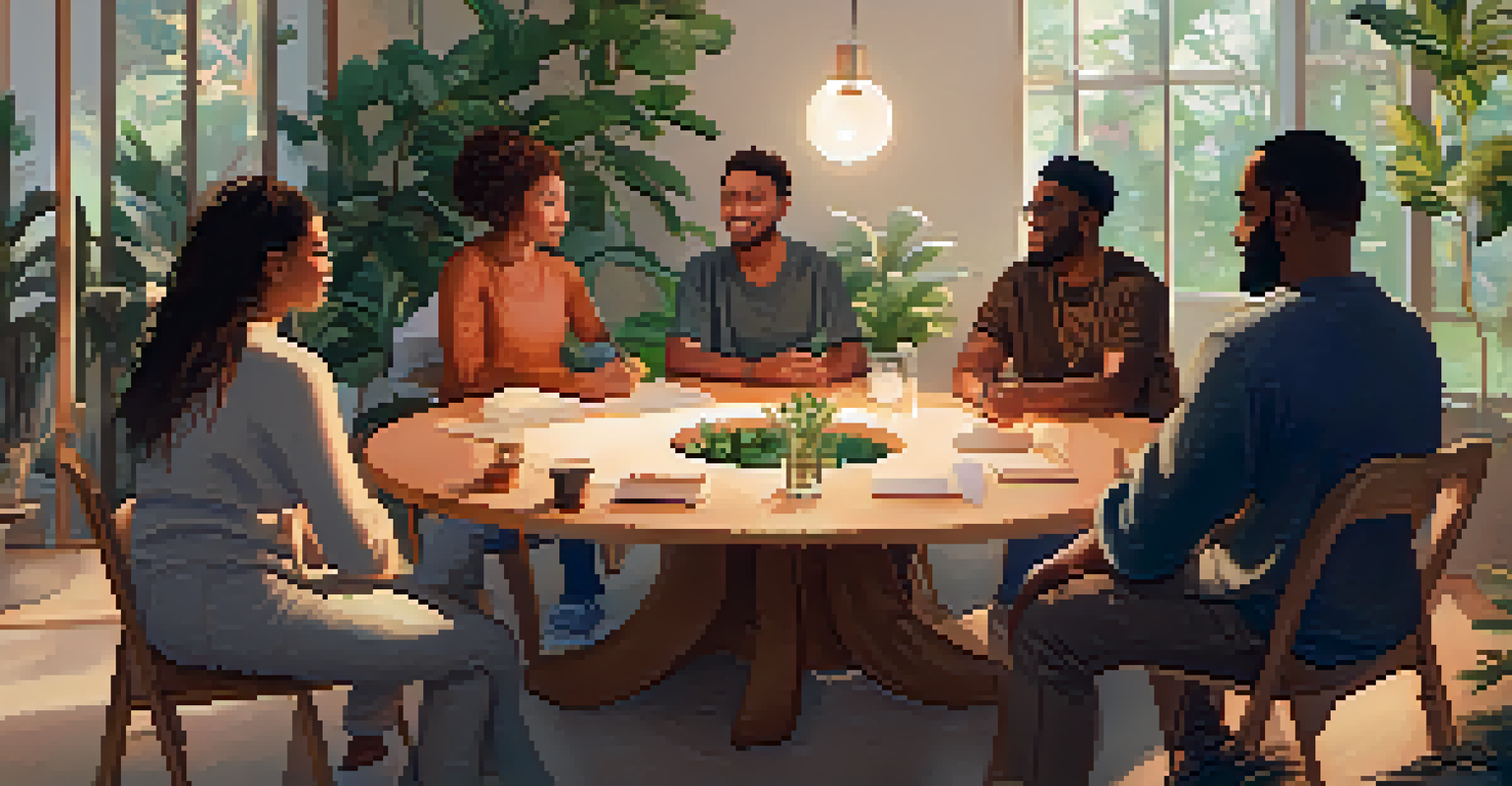Patient Engagement with Apps in Hallucinogen Therapy

Understanding Hallucinogen Therapy and Its Benefits
Hallucinogen therapy involves using substances like psilocybin or MDMA to treat mental health conditions. These therapies can unlock profound insights and emotional healing, often benefiting patients who have not responded to traditional treatments. As more research supports their efficacy, integrating technology becomes essential to optimize these therapies.
The mind is everything. What you think you become.
The potential of hallucinogens lies in their ability to promote emotional breakthroughs and facilitate therapeutic conversations. Patients often report feeling a deeper connection to themselves and their experiences, leading to significant personal growth. However, navigating this journey can be challenging, which is where patient engagement through apps comes into play.
By leveraging technology, therapists can enhance the therapeutic experience, making it more accessible and tailored to individual needs. Apps can provide resources, support, and tracking mechanisms that help patients prepare for and reflect on their sessions. This integration fosters a sense of community and accountability, essential for effective therapy.
The Role of Apps in Enhancing Patient Engagement
Apps designed for hallucinogen therapy provide various tools to enhance patient engagement. They can offer guided meditations, educational resources, and journaling features that allow patients to document their experiences. This multifaceted approach helps patients feel more prepared and supported throughout their therapy journey.

Moreover, these apps often include community features where patients can connect with others undergoing similar experiences. Sharing stories and insights can create a sense of belonging and reduce feelings of isolation. This peer support is invaluable, especially in a field that is still emerging and can feel daunting for many.
Apps Enhance Hallucinogen Therapy
Integrating apps into hallucinogen therapy improves patient engagement by offering resources, support, and personalized experiences.
Additionally, apps can facilitate communication between patients and therapists, allowing for quick check-ins and feedback. This ongoing dialogue ensures that patients feel heard and supported, creating a more personalized therapeutic experience. In essence, apps serve as a bridge between the therapy sessions, enhancing overall engagement and effectiveness.
Features of Effective Patient Engagement Apps
When considering the features of effective patient engagement apps, user-friendliness is paramount. Patients need to easily navigate the app without feeling overwhelmed, especially during vulnerable moments. Intuitive design, clear navigation, and accessible language help ensure a positive user experience.
The greatest discovery of my generation is that a human being can alter his life by altering his attitude of mind.
Another crucial feature is the inclusion of educational content. Patients benefit from understanding the substances they are using, the therapeutic process, and what to expect. By providing this knowledge, apps empower patients to take an active role in their therapy, fostering a sense of control and engagement.
Lastly, customization is essential. Each patient's journey with hallucinogens is unique, and apps should allow for personalized settings and preferences. Whether it's tracking emotions, setting reminders for sessions, or customizing meditation lengths, providing tailored options enhances patient engagement significantly.
Challenges in Implementing Apps for Therapy
While the integration of apps into hallucinogen therapy shows promise, several challenges exist. One major hurdle is ensuring that patients feel comfortable using technology in therapeutic contexts. Some individuals may feel overwhelmed by digital tools or skeptical about their effectiveness, which can hinder engagement.
Data privacy and security are also significant concerns. Patients must trust that their sensitive information is protected, as confidentiality is paramount in therapy. App developers must prioritize robust security measures to foster this trust and encourage more patients to engage with the technology.
Patient Feedback Drives App Improvement
Listening to patient feedback is crucial for continuously enhancing app features and ensuring they meet users' needs effectively.
Lastly, there's the challenge of ensuring that the content provided is evidence-based and aligns with therapeutic goals. Misinformation can lead to confusion and undermine the effectiveness of therapy. Continuous collaboration between mental health professionals and app developers is essential to create reliable and effective resources.
The Future of Apps in Hallucinogen Therapy
Looking ahead, the future of apps in hallucinogen therapy appears promising, with ongoing advancements in technology. As more research emerges, apps can evolve to incorporate new findings and techniques, enhancing their effectiveness. This dynamic nature of technology makes it an exciting tool for improving patient engagement.
Moreover, as society becomes more accepting of alternative therapies, the demand for supportive apps is likely to grow. Increased awareness and understanding of hallucinogen therapy could lead to a broader audience seeking these resources. This shift could promote further innovation and development in app features and functionalities.
Finally, collaboration between tech developers and therapists will be crucial in shaping the future landscape of these apps. By working together, they can create tools that not only support patients but also enhance the therapeutic process. This partnership will be key to maximizing the benefits of hallucinogen therapy and ensuring a holistic approach to mental health care.
Patient Feedback: The Key to Improvement
Listening to patient feedback is essential for the continuous improvement of engagement apps. Patients can provide valuable insights into what features work, what needs enhancement, and any additional tools they might find helpful. This feedback loop ensures that the app evolves to meet the needs of its users effectively.
Surveys and interviews can be instrumental in gathering this feedback. By actively seeking input, developers can make informed decisions about updates and new features. This collaborative approach fosters a sense of ownership among patients, encouraging them to engage more deeply with the app and their therapy.
Future Collaboration is Key
The partnership between tech developers and therapists will shape the future of hallucinogen therapy apps, maximizing their benefits.
Additionally, implementing an easy feedback mechanism within the app allows for real-time suggestions and comments. This immediate communication channel can lead to quicker improvements and a more responsive user experience. Ultimately, prioritizing patient feedback creates a more effective and engaging app.
Conclusion: Embracing Technology in Therapy
In conclusion, the integration of apps in hallucinogen therapy represents a significant advancement in enhancing patient engagement. By providing resources, community support, and personalized experiences, these apps can transform the therapy process. The potential for personal growth and healing is immense when patients feel supported and informed.
As we navigate the challenges of implementation and data security, the ongoing dialogue between patients, therapists, and developers will be crucial. Together, they can create a landscape where technology and therapy coexist harmoniously, promoting mental health and well-being. This collaborative spirit will pave the way for more innovative solutions in the future.

Ultimately, embracing technology in therapy not only enhances patient engagement but also fosters a deeper understanding of mental health. As hallucinogen therapy continues to gain recognition, the role of apps will undoubtedly grow, helping more individuals embark on their healing journeys with confidence and support.